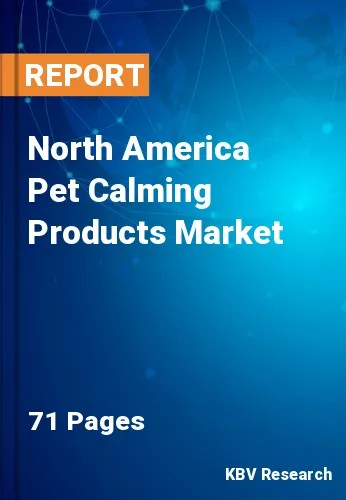The North America Pet Calming Products Market would witness market growth of 4.9% CAGR during the forecast period (2022-2028).
Older pets have anxiety that comes with getting older, which can be combined with cognitive impairment syndrome (CDS). Memory, awareness, learning, and perception get worse in dogs with CDS, just like they do when people get Alzheimer's. Older pets are left confused and worried because of this. Dogs with anxiety might urinate or poop in the apartment, pant a lot, act destructively, get depressed, bark too much, pace, be restless, or do the same thing over and over.
Some of these symptoms may result from sporadic anxiety-inducing situations, but any of them might become recurring and lead to more significant problems. Yet, aggressiveness is by far the most harmful indication of dog anxiety. Depending on the circumstances, this violence may be aimed directly or indirectly.
Direct aggression happens when a dog displays hostile behavior against humans or other animals. As harmful as direct aggression, indirect aggressiveness typically occurs when a person intervenes between a dog and the cause of its aggression, such as another dog. Even if a dog is prohibited from injuring people, aggressive behaviors such as growling and barking can lead to undesirable circumstances for humans and canines.
Pet owners became more responsive to food, treats, other supplies, and services with health and wellness advantages. Many pet owners in Canada said that they now spend more on their pets than they did in the past. In the economy after COVID, pet owners' spending is also affected by their understanding of sustainability and animal welfare, the growing role of technology in the pet industry, and a growing interest in fresh and frozen pet food options. Pet owners are likely to buy and use more pet-calming products because they care a lot about their pets and are willing to spend more money on their care, which is expected to help the market grow in the region.
The US market dominated the North America Pet Calming Products Market by Country in 2021, and would continue to be a dominant market till 2028; thereby, achieving a market value of $5,706 Million by 2028. The Canada market is poised to grow at a CAGR of 7.3% during (2022 - 2028). Additionally, The Mexico market would witness a CAGR of 6.3% during (2022 - 2028).
Based on Pet Type, the market is segmented into Dog, Cat and Others. Based on Distribution Channel, the market is segmented into Offline and Online. Based on Type, the market is segmented into Snacks & Treats, Food & Supplements, Gel & Ointment, Spray & Mist and Others. Based on countries, the market is segmented into U.S., Mexico, Canada, and Rest of North America.
Free Valuable Insights: The Global Pet Calming Products Market is Predict to reach $20.6 Billion by 2028, at a CAGR of 5.6%
The market research report covers the analysis of key stake holders of the market. Key companies profiled in the report include Virbac, Zoetis, Inc., Ceva Santé Animale, NOW Foods, Inc., PetHonesty (Vestar Capital Partners), Nestlé Purina Petcare Company (Nestle S.A), PetIQ, Inc., Swedencare (Garmon Corporation) and Health & Happiness (H&H) Group International Holdings Ltd. (Zesty Paws)
By Pet Type
By Distribution Channel
By Type
By Country
Our team of dedicated experts can provide you with attractive expansion opportunities for your business.

